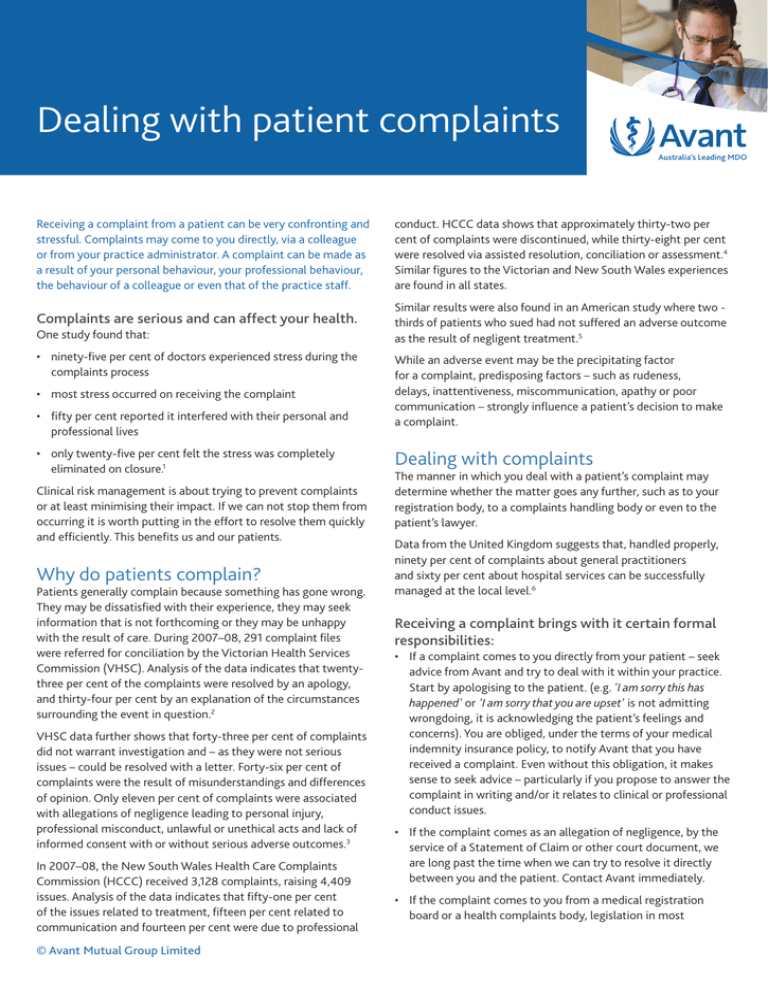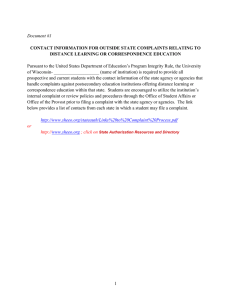Dealing with patient complaints
advertisement

Dealing with patient complaints Australia’s Leading MDO Receiving a complaint from a patient can be very confronting and stressful. Complaints may come to you directly, via a colleague or from your practice administrator. A complaint can be made as a result of your personal behaviour, your professional behaviour, the behaviour of a colleague or even that of the practice staff. conduct. HCCC data shows that approximately thirty-two per cent of complaints were discontinued, while thirty-eight per cent were resolved via assisted resolution, conciliation or assessment.4 Similar figures to the Victorian and New South Wales experiences are found in all states. Complaints are serious and can affect your health. Similar results were also found in an American study where two thirds of patients who sued had not suffered an adverse outcome as the result of negligent treatment.5 One study found that: • n inety-five per cent of doctors experienced stress during the complaints process • most stress occurred on receiving the complaint • fi fty per cent reported it interfered with their personal and professional lives • o nly twenty-five per cent felt the stress was completely eliminated on closure.1 Clinical risk management is about trying to prevent complaints or at least minimising their impact. If we can not stop them from occurring it is worth putting in the effort to resolve them quickly and efficiently. This benefits us and our patients. Why do patients complain? Patients generally complain because something has gone wrong. They may be dissatisfied with their experience, they may seek information that is not forthcoming or they may be unhappy with the result of care. During 2007–08, 291 complaint files were referred for conciliation by the Victorian Health Services Commission (VHSC). Analysis of the data indicates that twentythree per cent of the complaints were resolved by an apology, and thirty-four per cent by an explanation of the circumstances surrounding the event in question.2 VHSC data further shows that forty-three per cent of complaints did not warrant investigation and – as they were not serious issues – could be resolved with a letter. Forty-six per cent of complaints were the result of misunderstandings and differences of opinion. Only eleven per cent of complaints were associated with allegations of negligence leading to personal injury, professional misconduct, unlawful or unethical acts and lack of informed consent with or without serious adverse outcomes.3 In 2007–08, the New South Wales Health Care Complaints Commission (HCCC) received 3,128 complaints, raising 4,409 issues. Analysis of the data indicates that fifty-one per cent of the issues related to treatment, fifteen per cent related to communication and fourteen per cent were due to professional © Avant Mutual Group Limited While an adverse event may be the precipitating factor for a complaint, predisposing factors – such as rudeness, delays, inattentiveness, miscommunication, apathy or poor communication – strongly influence a patient’s decision to make a complaint. Dealing with complaints The manner in which you deal with a patient’s complaint may determine whether the matter goes any further, such as to your registration body, to a complaints handling body or even to the patient’s lawyer. Data from the United Kingdom suggests that, handled properly, ninety per cent of complaints about general practitioners and sixty per cent about hospital services can be successfully managed at the local level.6 Receiving a complaint brings with it certain formal responsibilities: • If a complaint comes to you directly from your patient – seek advice from Avant and try to deal with it within your practice. Start by apologising to the patient. (e.g. 'I am sorry this has happened' or 'I am sorry that you are upset' is not admitting wrongdoing, it is acknowledging the patient’s feelings and concerns). You are obliged, under the terms of your medical indemnity insurance policy, to notify Avant that you have received a complaint. Even without this obligation, it makes sense to seek advice – particularly if you propose to answer the complaint in writing and/or it relates to clinical or professional conduct issues. • If the complaint comes as an allegation of negligence, by the service of a Statement of Claim or other court document, we are long past the time when we can try to resolve it directly between you and the patient. Contact Avant immediately. • If the complaint comes to you from a medical registration board or a health complaints body, legislation in most Dealing with patient complaints states and territories prohibits you from then contacting the complainant personally. Contact Avant immediately. • If a complaint is made about you – to your practice principal, supervisor, director of medical services, practice manager, etc, you have certain rights such as being given an unabridged copy of the complaint and given time to consider your response. You should also be encouraged to speak to Avant, if you have not already done so, and you must not be denied 'natural justice'. Dealing with direct patient complaints Every practice and clinic should have a protocol for dealing with direct patient complaints. This is part of the systems approach to clinical risk management. • A lways deal with complaints of a clinical nature yourself. Complaints about the practice or administrative issues may be dealt with by you or by your practice manager. • A staff member should be designated to deal with complaints about your practice administration. Patients need to see that their complaint is being taken seriously and is being handled by someone with sufficient authority and sensitivity to address and resolve their concerns. • D o not ignore complaints. It is prudent to deal with complaints quickly (that day if possible) with an emphasis on resolving the concerns. • S peak directly with the patient if they have made a complaint – preferably face-to-face if practicable – and listen! • E ncourage the patient to tell you what has happened in their own words – and listen! • Make sure you fully understand: what the complaint is about who is it about what the patient wants in making the complaint. • E stablish the scope of the complaint. All that the patient may expect is to see a copy of a test result or report, have it explained or to receive an apology for being kept waiting for an extended period. • C omplaints that seem trivial to you may be emotionally charged for the patient. • A cknowledge the complaint and the patient’s feelings: ‘I can see that you’re upset, it must have been frustrating for you…’ etc. That is, acknowledge the patient’s distress and then, if appropriate, validate it. If you are also upset about © Avant Mutual Group Limited an outcome, tell the patient ‘this is not the outcome either of us wanted or anticipated’. There is nothing wrong with demonstrating empathy – making sure the patient knows they have been seen, heard and understood. • D elay billing the patient or pursuing payment until the complaint has been resolved. Pursuing payment in the context of a complaint has been shown to increase willingness by the patient to take the matter further.7 As an act of good faith, consider not sending a bill. • A pologise if the practice or your own actions have contributed to the problem. Statements which simply express regret, such as ‘I am very sorry this has happened’, cannot be interpreted as an admission of liability. Resolving the complaint • O nce a complaint has been received, in writing or orally, acknowledge in writing that you have received it. Follow this up with a phone call if it is not something that can be resolved simply. Let the patient know that you are looking into it and will be reporting to them by a specific date. Make absolutely certain you do contact them on that day – even if it is only to say that you don’t yet have an answer. • G ather the facts: review the medical notes, copies of reports, records of phone calls, discussions with relevant staff, check local protocols and check what happened on that day. • C onsider whether you need specific advice from Avant about the circumstances and/or plan of management. • W here appropriate suggest a meeting to discuss the patient’s concerns. Encourage the patient to bring a friend or partner to accompany them if they wish. Suggest an interpreter if language is a barrier. Allow plenty of time. Find a quiet, private room for the conversation. • P rovide information. Most people who complain wish to obtain information about what happened and what it means for them. Provide them with this information. • C onsider the factors that led to the complaint – are there changes that can be made to prevent a recurrence? If so, tell the patient as they will wish to see that you take the complaint seriously and that it will make a difference. • K eep parties informed. If there will be delays while you seek out facts or will not be available, say so, as uncertainty or ‘no response’ only adds to the grievance. • P atients’ annoyance only increases if there is a perceived lack of or breakdown in communications. Dealing with patient complaints How to ‘wrap it up’ • P rovide a summary of what has been covered, what has been achieved and check whether the patient is satisfied that their concerns have been addressed. • C larify what will happen next. If follow-up is required, make sure it happens. • T ry to preserve the therapeutic relationship. However, if you feel that the relationship can no longer be sustained because of the complaint, there are ways of managing this – seek advice from Avant to find out more. • A pologise and acknowledge the distress that may have been caused. Learning from complaints Monitoring and reviewing complaints should be part of every practice. Information about near misses, adverse events and complaints provides an opportunity to improve the standard of service and care. Again, this is what clinical risk management is all about. Looking after yourself In the face of a complaint it is difficult not to become defensive. Don’t deny the issue or blame the patient for being difficult, noncompliant or hostile. Ignoring the problem or handling it poorly may only create more stress. Seek advice and support from Avant, your medical defence organisation. References 1 Gautam, M: Coping with Complaints Medical Post August 24, 2004 p.22. For further reading, see also: Nash, L., Curtis, B., Walton, M., Willcock, S. and Tennant, C. The response of doctors to a formal complaint. Australasian Psychiatry 2006: Vol 14 (3) pp: 246 – 250. 2 Victorian Office of the Health Services Commissioner. Annual Report 2008: 18-9: www.health.vic.gov.au/hsc/downloads/annrep08.pdf. 3 Ibid., 16. 4 New South Wales Health Care Complaints Commission. Annual Report 20072008. http://www.hccc.nsw.gov.au/Publications/Annual-Reports/default.aspx 5 Leape L, Breena T, et al: Incidence of Adverse Events and Negligence in Hospitalised Patients NEJM. 1991:324:6:370-376. 6 Kilpatrick A: Resolving Complaints, BMJ Career Focus 2004:328:s33-34 (24 January). 7 Penchansky DBA: McCnee C Initiation of Malpractice Suits: A Conceptualisation and Test Medical Care, 1994 Vol.32,8 pp.813-831. © Avant Mutual Group Limited Disclaimer This is general information relating to legal and/or clinical issues within Australia. It is not intended to be legal advice, nor and should not be considered as a substitute for obtaining personal and specific legal and/or other professional advice. Whilst we endeavour to ensure that professional documents are as current as possible at the time of their preparation, we take no responsibility for matters arising from changed circumstances or information or material which may have become available subsequently. Avant Mutual Group Limited and its subsidiaries will not be liable for any loss or damage, however, caused (including through negligence) that may be directly or indirectly suffered by you or anyone else in connection with the use of information provided in this forum.
